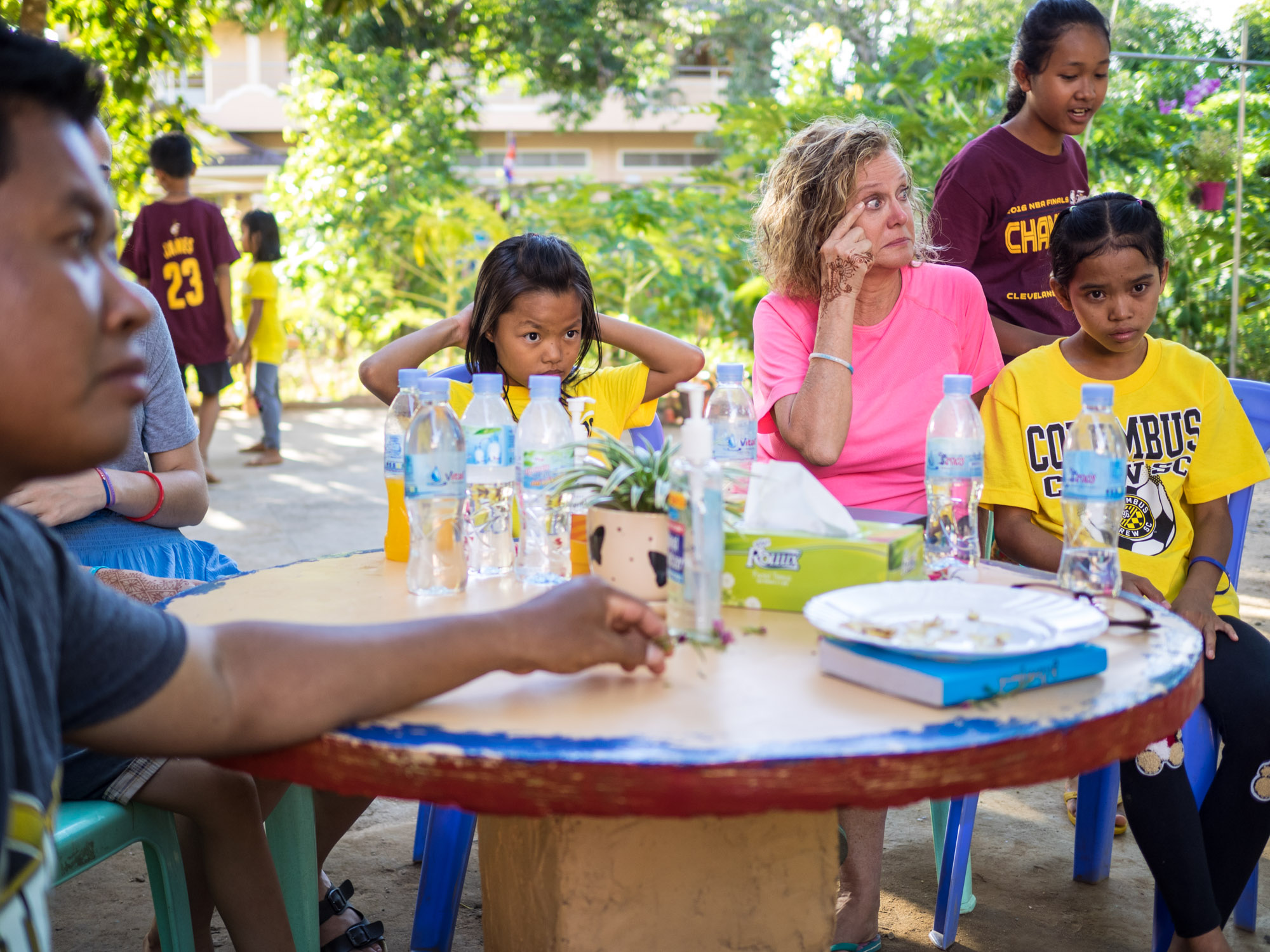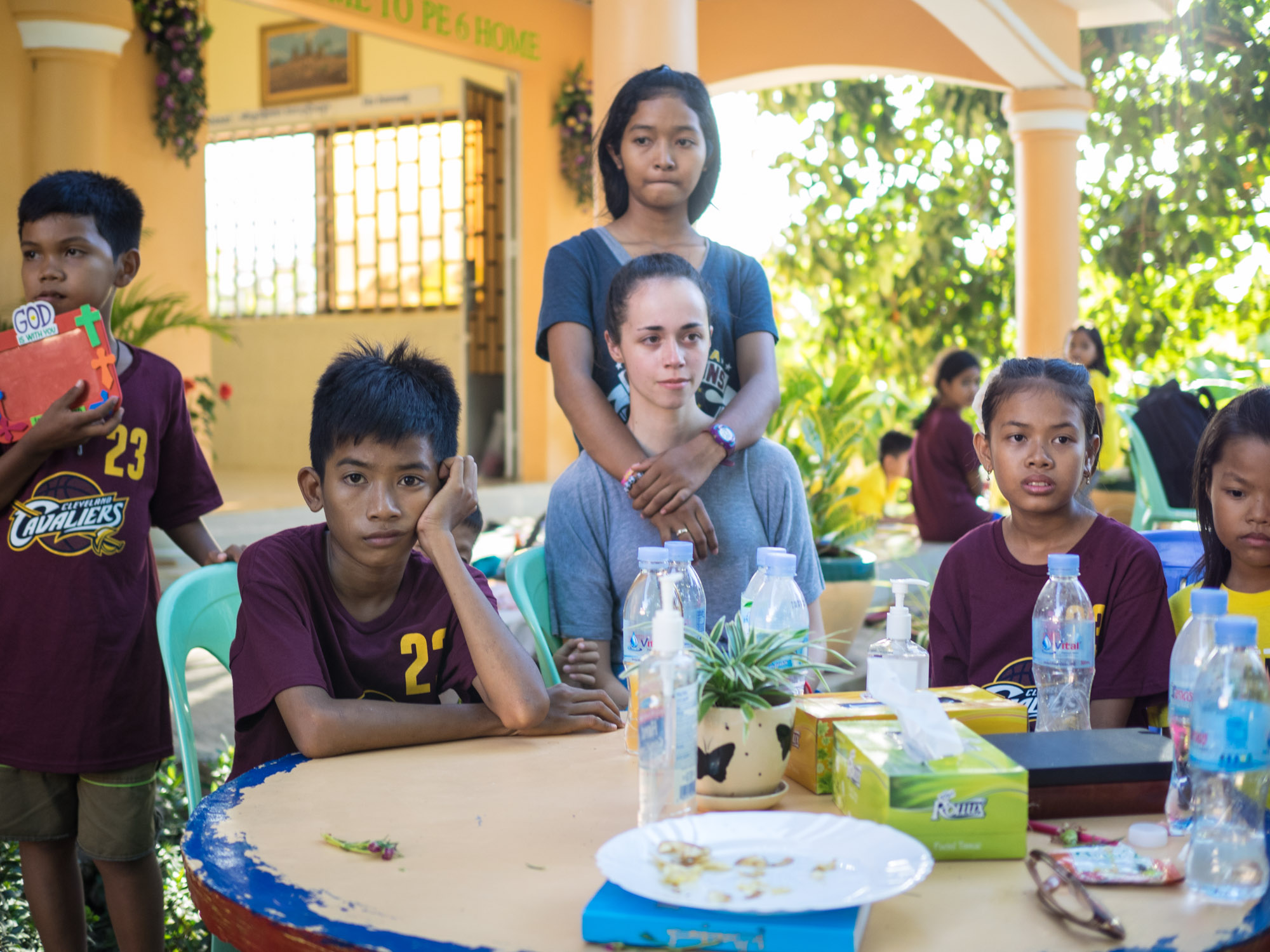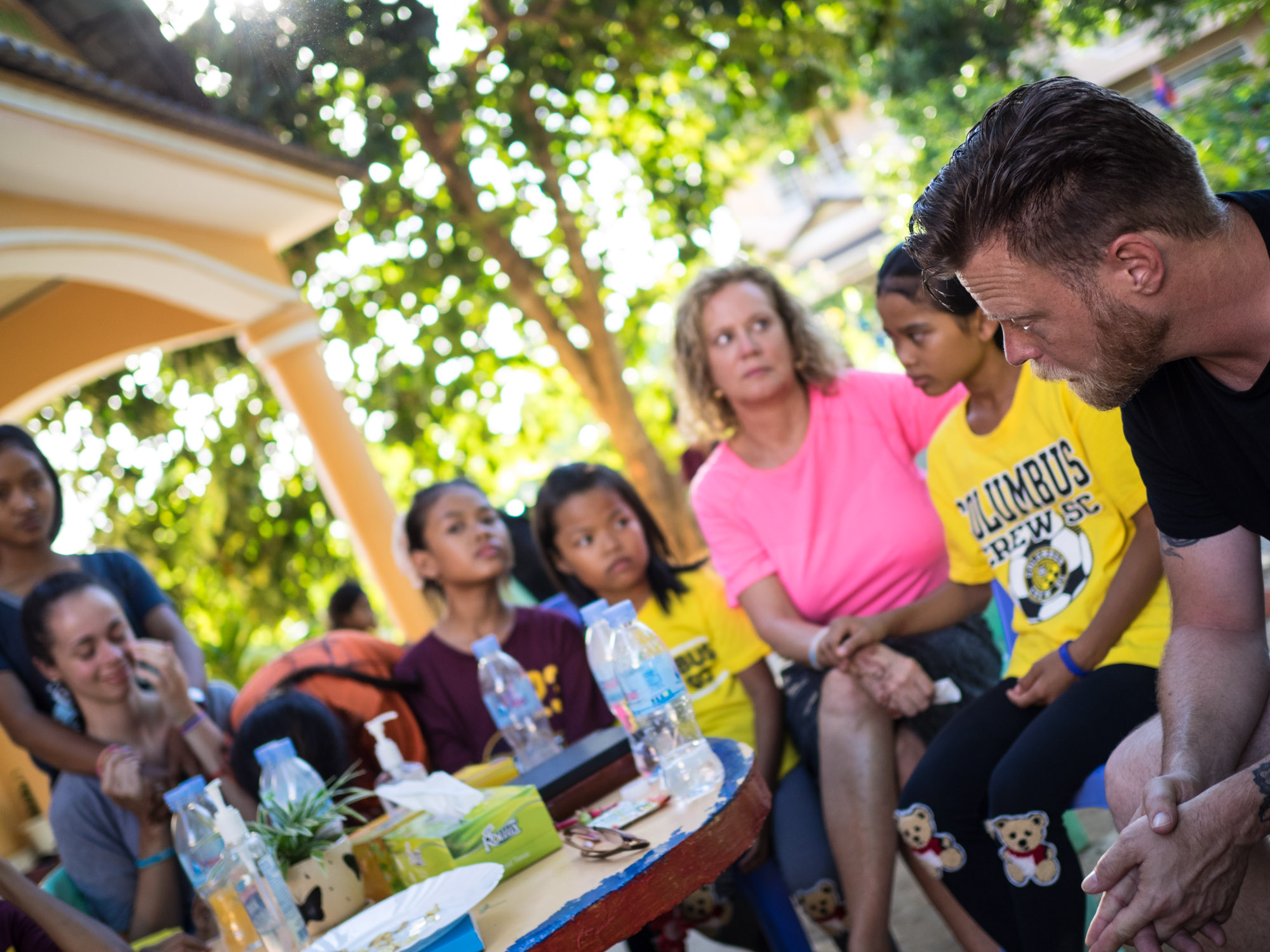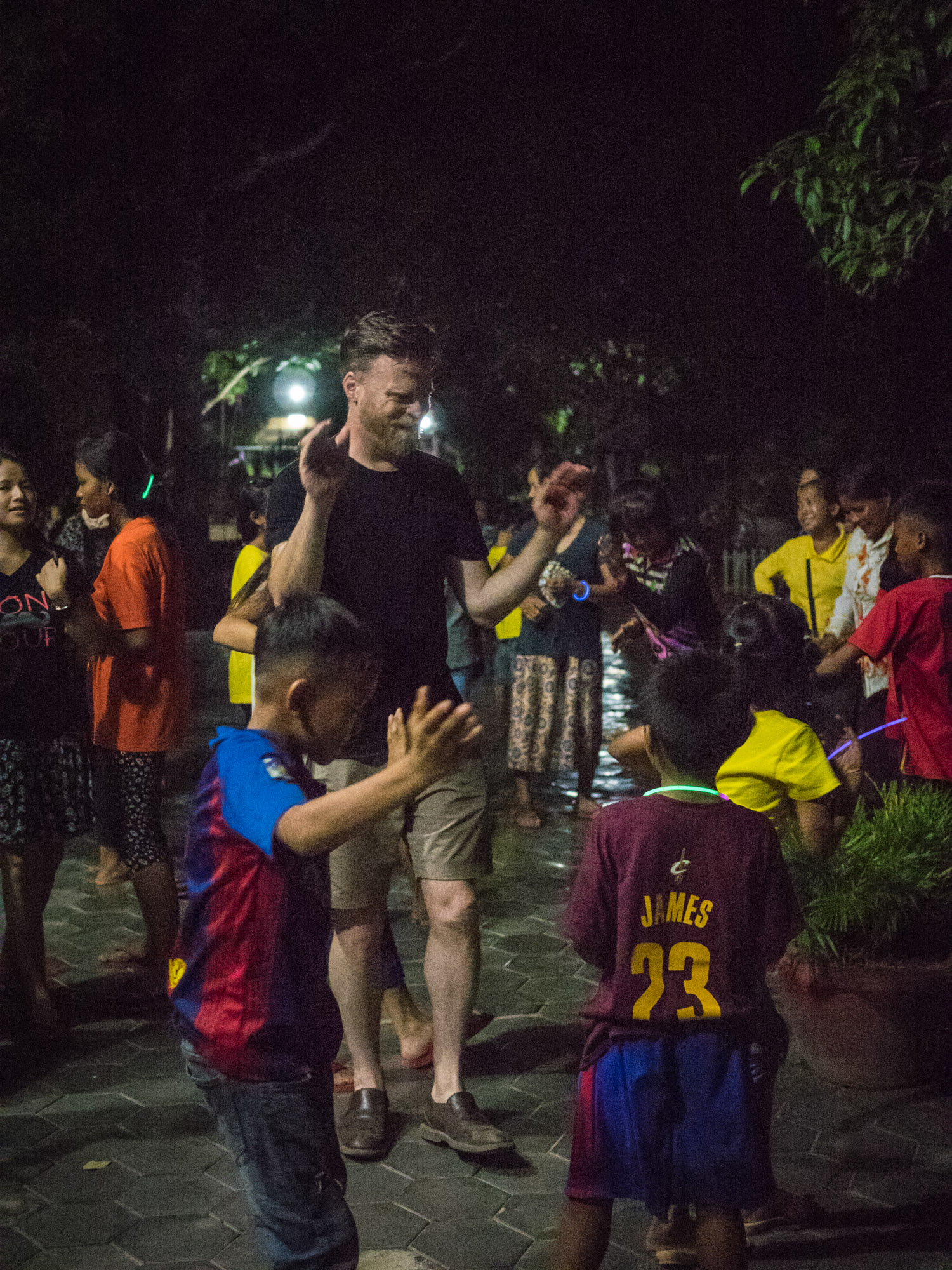Left it on the dance floor
For a while there I thought I could go an entire 13 weeks in Asia without getting sick. And, if you're not counting a day or two of mild intestinal discomfort in India, I almost made it. But I knew by yesterday morning that I was heading toward a mandatory day off and a visit to the pharmacist.
I could feel it coming on as I made the 40 minute drive to church: I was feeling irritable, I had the beginnings of a migraine, my stomach hurt and I was just plain worn out. I only made it through the first song before excusing myself and heading for a shady spot for some peace and relative quiet. After the service, I joined the team for lunch at Prek Eng 6 and only pecked at the food.
At some point (the details are fuzzy) I stumbled over to the Prek Eng 2 home where Narun and Sophal were kind enough to lend me their bed for a couple of hours' sleep. I felt more or less refreshed and I got up intending to visit some of the other homes, but I made it about as far as the living room before deciding I really didn't want to go any further.
The kids and staff at PE2 took good care of me: they gave me water, a cold compress and a fan. They also gave me a mat and a pillow. I fell asleep again to the sounds of friendly voices chattering in Khmer, kids playing soccer out front and chickens meeting their demise in service of the evening's dinner.
At around 3pm I felt well enough to wander over to join my friends at PE6. Some of the kids were playing badminton, others were kicking a soccer ball, and a few were coloring quietly or reading stories with the team. I sat down at one of the tables in front of the house and began chatting with Samnang, the home's father and with Many, one of the home's two grandmothers. Anh, the Prek Eng 5 dad was also there and he helped translate some questions we had for Samnang and Many.
Samnang had shared his life story with us the night before: he was only five when the Pol Pot regime overthrew his country's government, unleashing four years of hellish genocide and two decades of civil war. Both of his parents were murdered by the Khmer Rouge, and after that regime fell, he was sent to live in a deplorable state-run orphanage with hundreds of children and only a handful of staff.
As a young teen, he was forced to become a soldier. He was terrified, but relished the idea of taking revenge on those who had slaughtered his family and destroyed his country. But when he actually engaged the Khmer Rouge soldiers in battle, he realized that they were not the invincible monsters of his nightmares — they were just like him: terrified, emaciated kids — miserable pawns in some incomprehensible, macabre game.





One day as he was patrolling with his unit in the jungle, he stepped a landmine which shredded his leg and left him bleeding to death on the ground. By God's grace, he was rescued by soldiers from one of the other three factions fighting the Khmer Rouge holdouts, and was taken to the sprawling and squalid Site Two Refugee Camp on the Thai/Cambodian border. Built to house 15,000 refugees, the camp ballooned to almost 200,000 by the time its residents were repatriated into Cambodia in 1993. Facing likely death from his injuries, he was taken to the smaller Khao I Dang camp, where he recuperated slowly over a period of a year and a half.
It was at this second camp where he heard the good news of the Gospel and committed his life to serving God. When the camps were emptied, he returned to his home town where he met and married his wife and began his ministry, first as an evangelist with Campus Crusade Cambodia, then as an outreach worker and pastor with World Relief. While at CCC, he worked with Savorn Ou, who would later become Asia's Hope Cambodia's national director. In 2015, Samnang, his wife and four children jumped at the chance to work with Asia's Hope, an organization he had admired for years.
I had heard parts of Grandma Many's story, but my wife Kori and I had felt such a strong connection with her, and I was anxious to know more about who she was and what had brought her to Asia's Hope.
When Anh told her I wanted to ask a few questions about her life, her eyes filled with tears. I took her hand and assured her that she didn't have to share any details if it was painful for her, but she shook her head and began to speak in Khmer. I speak the language very poorly, but I understood the basics even without translation. The words for "husband" and "children" and "killed" have become unsettlingly familiar over my past 16 years visiting Cambodia. Weeping, she told me why she always hugs my wife and gently presses her hands to Kori's face whenever we visit. "My two boys and my little girl. They killed them. And when I see Kori I think, 'She looks so much like my daughter.' Now she is like my daughter."
Samnang explained to me, "For many years she was alone. No one to take care of her. No one to love her. One of our staff asked her to work for Asia's Hope and now she is so happy! She has children again. And grandchildren. And she is so thankful for the opportunity to love and serve them."
As afternoon faded into evening, and a cool breeze chased away the humidity, we picked up our chairs and set up folding tables next door in the courtyard of the Asia's Hope school. We were joined by the other five homes, and we enjoyed a feast prepared by our staff and paid for by Vineyard Columbus. I nibbled on a piece of chicken, but lacked the appetite to indulge any further. The kids, however, ate plate after plate of delicious food and stuffed themselves with ice cream.
As dusk approached, we cleared away the tables and fired up the speakers. As always, the dancing started slowly. Along with 50 or so kids and a few of the staff, I ambled around the courtyard, inexpertly twirling my hands in a vain attempt to approximate the graceful motions of the more experienced dancers. As the sky dimmed, the music got louder and the dancing more energetic. Before long, almost all of the six homes' 140 kids — and a whole lot of the adults — were laughing and shouting, whirling and stomping, reveling without reservation in the restoration of the fatherless and the widow and the healing of broken dreams.
After about two hours of hilarity, the festivities drew to a close. The university students who had come home for the weekend packed up their books and headed out on their scooters to their various dorms, and I knew I was D-O-N-E. The Vineyard team was clearly exhausted, and I thought for a moment that I was going to pass out. I had spent every ounce of my energy and had borrowed some at high interest. And I was pretty sure I'd have to pay when morning rolled around.
And when I woke up at about 5am with a pounding headache and nauseated chills, I knew that much of today would be spent in bed. It's now about 6pm. I've started my course of antibiotics and slept on and off throughout the morning and afternoon. The team is out at Prek Eng with the kids, and I'm just now starting to get a little hungry.
I'm praying that I feel better after a good night's sleep. I have important meetings tomorrow with Savorn and also with the U.S. Chamber of Commerce here in Phnom Penh. On a certain level, I probably shouldn't have pushed it so hard yesterday. But it was worth it, and I wouldn't take it back if I could.
May God continue to bless our work here. Thank you for your generosity and your prayers.





































